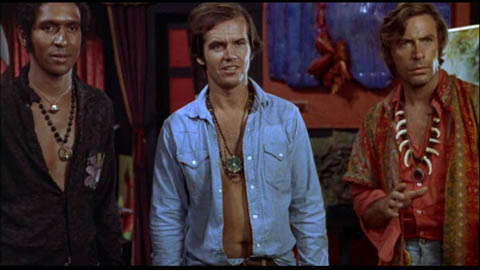Psych-Out
As the opening moments of this film unspooled, showing San Francisco in the height of the hippie era of the 60s, a small part of me wondered aloud “Why can’t it be like this again?”. Indeed, in our modern age which has proven the liberal agenda to be just as vicious and judgmental as the Right, one feels a fondness for the days when people just accepted each other for who they are, warts and all, living in communes, smoking pot, and living for the nights when the hot new psychedelic band would be in town. Happily, we still have time capsules like this 1968 effort, featuring many countercultural film icons of the era including Dean Stockwell, Jack Nicholson, Bruce Dern, Adam Rourke, Max Julien, and even Henry Jaglom. Director Richard Rush and DP Laszlo Kovacs do a fine job in presenting the scene as it was then in telling the story of a beautiful deaf girl, played by Susan Strasberg in a lovely, compelling turn, searching for her brother (Dern), who has become known as a mad hippie prophet known as “The Seeker”, aided by a rock band led by Stoney (Nicholson) and their far out friend Dave (Stockwell) who has become so withdrawn from society that he lives by myself in an air duct on the roof of a building. Among the film’s flaws is its tendency to meander a bit from the main story, dragging the pace down a bit with side concerns such as Stoney’s band seeking fame and fortune (and the entertaining subsequent debates between him and Dave about whether that would constitute selling out). Ironically, of the three male leads, Nicholson is actually the LEAST interesting since he comes off as the most “square” of the bunch, and yet he gets (by far) the most screentime, when I would’ve liked to have seen more of Stockwell’s uber-hippie or perhaps some of the often-referred to mad rants of Dern’s Seeker. Regardless, there are plenty of evocative moments which the viewer realizes could have only come from that particular period in time and space, but everything becomes undone by the downbeat, absolutely depressing ending featuring the death of one of the characters. This hurts the film for two reasons: It plays like a poor-man’s version of Easy Rider’s ending, trying and failing to symbolize it as a “eventual death of the counterculture” moment, and even worse, it takes the unbiased point of view of these people the movie had retained and turns it into a “cautionary tale” straight out of an afterschool special. One wonders what the film’s original concept (by Nicholson) would’ve turned out to be like, before it was completely rewritten and changed, with Nicholson’s compensation being he was allowed to star as (and write all the dialogue for) the Stoney character. In the end, a fine remembrance of the 60s that plays it a little too safe at the wrong moments…
7/10
